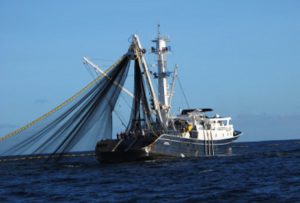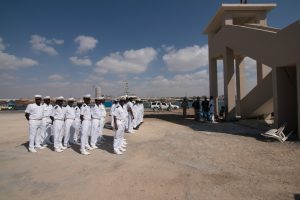This March, the mainstream media largely focused on the seizure of the Comoros-flagged oil tanker Aris 13 off the coast of Somalia, while at the same time ignoring the transnational illegal fishing vessels breaching the international maritime law and plundering the country’s rich fishing grounds. As is often the case with the news media, the whole problems of illegal fishing in the Somali territorial waters are most overlooked or minimized out of sheer ignorance or out of a desire to sensationalize matters. Instead of exposing the economic, political, and social implications of illegal fishing piracy which costs a sizable percentage of the country’s GDP. For example, in 2012 it represented over 20% of the total GDP.
Unusual flotilla of industrial fishing boats from the four corners of the world boldly take advantage of Somalia’s instability, hauling in three times more than Somali fishermen, an estimated 132,000 metric tons of fish each year compared to Somalia’s catch of 40,000 metric tons. This estimate of illegal fishing could be far more if through research were to be done.

Illegal Fishing in Somali waters is a transnational organized crime
Criminal activities in the fisheries sector are often regarded as synonymous with illegal fishing, which many countries do not view or prosecute as criminal offenses, but rather as a fisheries management concern, attracting low and usually administrative penalties. Transnational organized criminal organizations, thus engage in fisheries crime with relative impunity due both to low risk and high profits, which in turn allowed the fleets of distant water, industrial fishing boats sail for the Somali waters bulldozing the seafloor and indiscriminately hauling in vast amounts of fish and marine mammals in vessels of every description with little regard to the marine ecosystem – in flagrant breach of international maritime law, leaving extensive damage behind at the expense of the artisanal fishermen who hold up the coastal community’s economy into financial ruin.
The magnitude of the economic and the social impact of the illegal fishing piracy in Somali waters is not yet fully known, though more evident in the country’s huge depleted fishing stock and loss of income for Somalis and the cruel violence against local fishers.

Fish market in Mogadishu – Somalia
The international Naval forces guarding commercial ships from piracy in this vital global trading route – the gateway in and out of the Suez Canal should act not only as a military deterrent, but should also have served as coastguards for the Somali people; unfortunately, that didn’t happen, the absence of clear operational guidelines resulted in the multinational naval flotilla patrolling the Somali coastline, turning a blind eye to the problem of illegal fishing, and the international community has never had a strong interest in curtailing the illegal foreign fishing trawlers marauding the Somali exclusive economic zone (EEZ), to which, as a result wrestled from the promising Somali economy a source of revenue that could help build much-needed infrastructure, provide healthcare and education to the poor coastal communities.

The Somali Navy
The urgent need to rebuild the Somali coast guard is imperative and overdue. It is self-evident that fractions of spending on the multinational coalition naval task force patrolling the country’s sea waters mandated to protect commercial vessels from the pirates could be spent on something that would benefit everyone, a win-win cause – the rebuilding of the Somali Navy into a fully equipped coast guard – with the capabilities to patrol the country’s territorial waters, curb the transnational illegal fishing piracy and effectively tackle the problem of piracy in the region.
Addressing the root causes of the Somali Piracy
Piracy off the coast of Somalia is not simply an issue of criminality and security. The root cause of piracy in this region is the international illegal overfishing of Somali fishing waters which have threatened the livelihoods of local fishermen starting in the 1990s. In response, local vigilantes started to chase away the foreign fishing vessels. Violent clashes at sea intensified and piracy activities grew rapidly. Despite counter-piracy operations, which fail to address the root causes, the Somali society remains torn by poverty and violence. According to the GPF: Understanding Somali Piracy on Land and Sea.
A United Nations report and several news sources have suggested that the piracy off the coast of Somalia was caused in part by illegal fishing by foreign boats taking advantage of the war, which resulted in lost fishing income to local communities. According to the DIW and the US House Armed Services Committee, the dumping of toxic waste in Somali waters by foreign vessels also severely constrained the ability of local fishermen to earn a living.
Is this the time to stop ignoring the root causes of piracy, the communities destroyed by the transnational illegal fishing, the dumping of the toxic waste in a nation recovering from decades of lawlessness, but also to redefine the outdated notion of maritime piracy – the robbery or illegal violence at sea?
written by: Abdirashid Salah– Executive Director & Sr. Analyst at ISIR Consulting




